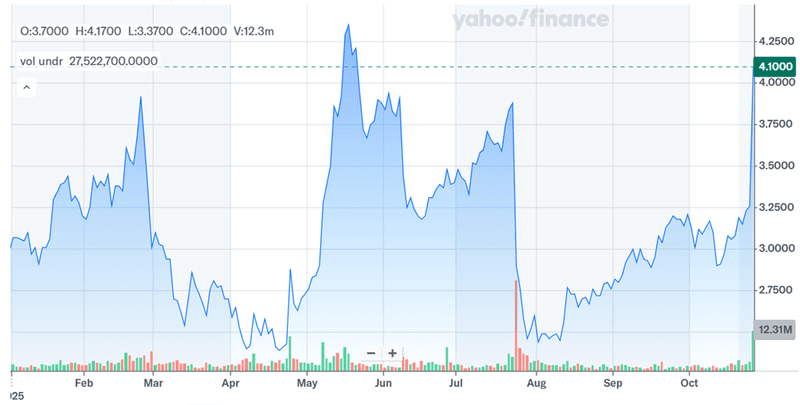Community Health Systems (NYSE: CYH), a small-cap healthcare provider operating dozens of hospitals across the United States, is once again attracting acquisition attention. Recently, the company confirmed that it had entered into a definitive agreement with Tenor Health Foundation to divest three of its Pennsylvania-based hospitals—Regional Hospital of Scranton, Moses Taylor Hospital, and Wilkes-Barre General Hospital. While the terms remain undisclosed and the deal is contingent on regulatory approvals and Tenor's financing, the development adds a new layer to CYH’s broader divestiture strategy discussed in its Q3 2025 earnings call. The move comes amid CHS’s push to streamline operations, reduce leverage, and improve free cash flow. With inpatient admissions flat but revenue per admission up, the small-cap operator is signaling progress on its turnaround goals. The interest from Tenor Health Foundation may go beyond these three assets—especially given CYH’s discounted valuation, infrastructure scale, and presence in underserved markets.
Strategic Market Footprint & Local Monopolies
Community Health Systems operates in several medically underserved and economically sensitive regions where it often holds dominant or near-monopoly positions. These geographies present significant opportunities for Tenor Health Foundation to expand its presence in rural and secondary healthcare markets without the intense competitive pressure that exists in urban hospital systems. The three Pennsylvania hospitals included in the current deal—two in Scranton and one in Wilkes-Barre—illustrate the type of markets CHS focuses on: mid-size communities with limited acute care alternatives and a high dependency on local hospitals for inpatient, outpatient, and emergency care. By acquiring such assets, Tenor can leverage existing brand recognition and patient loyalty while avoiding the overheads of greenfield development. Additionally, many of CHS's hospitals already serve as core access points for Medicaid and Medicare populations, which aligns with Tenor's likely non-profit or mission-driven focus. The ability to anchor care delivery in these communities can also open doors to supplemental federal and state funding streams. CHS’s existing physician recruitment pipeline and recent expansion into specialty services such as urology, neurosurgery, and robotic surgery—especially in underserved regions like Laredo, Texas and Las Cruces, New Mexico—offer a framework for further service line expansion under Tenor’s ownership. These types of embedded care networks offer synergistic potential when combined with Tenor’s funding access and community-focused governance. Moreover, in its Q3 earnings call, CHS noted significant investments in ambulatory and outpatient expansion—access points that could serve as future feeder systems into hospital campuses, increasing lifetime patient value.
Margin Recovery & Improved Capital Structure
One of the strongest incentives for Tenor Health Foundation to acquire assets from or possibly engage more deeply with Community Health Systems lies in the operator’s improving margin profile and disciplined capital structure evolution. For Q3 2025, CHS reported adjusted EBITDA of $376 million, up from $347 million in the prior-year quarter, with margins expanding to 12.2%—or 11.4% when excluding a legal settlement. This marks a steady recovery in core profitability metrics even as elective outpatient surgeries remain under pressure. Crucially, CHS has reduced its net leverage to 6.7x from 7.4x at year-end 2024, primarily through a $1.79 billion refinancing of its 2027 senior secured notes, pushing its next major maturity to 2029. For potential acquirers like Tenor, this debt restructuring offers an attractive de-risking of future capital obligations. It also increases the viability of funding ongoing operations and growth investments without near-term liquidity concerns. CHS’s careful cost controls on labor and supplies—alongside strategic physician additions and ERP-driven workflow efficiencies—signal ongoing management discipline. With year-to-date cash flows from operations totaling $403 million (excluding divestiture-related tax payments), the company is approaching sustainable free cash flow positivity, providing further financial flexibility. Tenor could leverage this margin stability by implementing mission-driven operational models that may improve quality ratings and payer mix even further. There’s also scope for Tenor to reduce non-core overhead and centralize shared services under its umbrella, offering synergy on the cost side without requiring disruptive restructuring.
Potential For Non-Profit Repositioning & Supplemental Payment Capture
A major strategic synergy Tenor Health Foundation could unlock is the conversion of acquired CHS assets into non-profit entities, potentially qualifying them for a broader array of supplemental payment programs. Community Health Systems remains a for-profit operator, and while it has benefited from state-directed payment (SDP) programs—like those in Tennessee and New Mexico contributing to 5.6% revenue per admission growth in Q3—many of these programs offer expanded benefits to mission-driven or safety-net providers. As noted during the earnings call, CHS is closely monitoring new or expanding SDP initiatives in Georgia, Florida, and Indiana, but its status may limit access to the most favorable tiers of funding. Tenor’s entry as a non-profit entity could unlock broader Medicaid Disproportionate Share Hospital (DSH) payments, 340B drug discounts, and favorable federal grant opportunities tied to community health reinvestment. Beyond financial levers, a foundation-controlled governance structure could enhance physician recruitment, reduce staff attrition, and improve quality metrics in a way that aligns with value-based care contracts. CHS management also flagged payer mix improvements and potential exchange-based volume upticks heading into Q4 2025, another area where a non-profit identity may appeal more to ACA exchange enrollees. Furthermore, in markets affected by immigration-related care delays—as noted in the Q3 call for regions in Arizona and Texas—community trust in a non-profit operator could accelerate patient re-engagement, especially for outpatient services. Tenor’s acquisition could therefore be more than financial; it could be a regulatory repositioning that enhances payment eligibility and long-term funding durability.
Final Thoughts

Source: Yahoo Finance
Community Health Systems’ stock price has zoomed up since the news of this recent part acquisition. Interestingly, the company currently trades at valuation multiples that reflect considerable market skepticism, potentially offering significant upside for a long-term strategic buyer like Tenor Health Foundation. Its LTM Price/Sales ratio sits at just 0.04x—a striking discount for an enterprise with over $12 billion in annual revenues. The forward NTM metrics also point to sustained dislocation: 8.27x EV/EBITDA and 0.97x EV/Revenues. While the company's NTM P/E is negative (-10.88x), this is largely a function of accounting adjustments, non-recurring legal settlements, and heavy depreciation—not necessarily core operational weakness. We believe that a strategic acquirer like Tenor could not only unlock asset value through better capital allocation but also potentially relist individual hospitals or assets in healthier capital markets, once synergies are realized.


